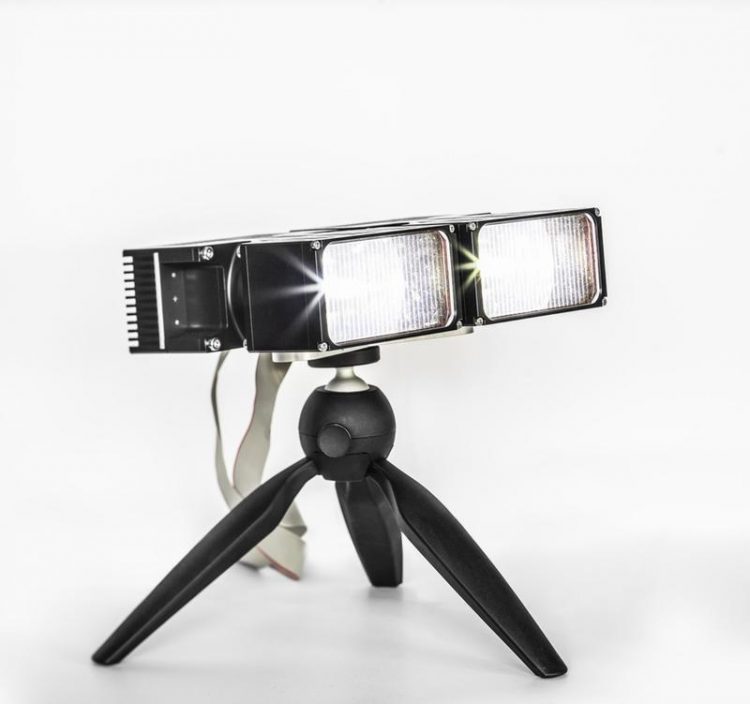MOC2020: Fraunhofer IOF organises international micro-optics conference in Jena

Segmented, automotive LED high beam. Fraunhofer IOF
Already in 2004, the city of Jena was chosen by the Japanese Society for Applied Physics as the venue for the International Microoptics Conference MOC (MOC'04).
This year the „City of Lights“ will again be honored: From September 24 to 26, 2020, the Fraunhofer Institute for Applied Optics and Precision Engineering IOF and the European Optical Society will again invite to Jena for the 25th anniversary to discuss new results, applications and challenges of microoptics.
The Microoptics Conference MOC is held annually in Japan and other countries, coordinated by the Microoptics Group of the Japan Society of Applied Physics. For many years, the conference has enjoyed increasing attendance and has become a central forum for microoptics.
Most recently, about 200 scientists from all over the world took part in the three-day, internationally renowned event. Guests are expected from Japan, the USA and many European countries.
Microoptics for automotive technologies
The lectures and workshops of the Microoptics Conference MOC2020 (“MOC2020”) include contributions to basic micro- and nanooptical research as well as a multitude of concrete application areas – from new design and manufacturing methods of microoptical components to application-ready optical systems in the fields of communication, illumination and quantum systems.
Further contributions to the conference deal with microoptics for measurement techniques and sensor technology, as well as for dynamic and functional components such as MEMS, switches or modulators.
For the first time, Fraunhofer IOF experts will present their combined expertise in the production of efficient and compact microoptics for the highly competitive automotive sector. The automotive sector especially benefits from mini-lenses, as the demands on light output and functionality are particularly high.
In addition to strictly defined sizes, it is above all requirements to improve the energy balance in the vehicle that define the acceptance of the use of optical systems in the car. The Jena experts have thus succeeded in overcoming the limits of established optical technologies for automotive head-lamps and significantly improving them in terms of miniaturization, efficiency and design.
Among other things, an array projection approach, a glare-free optical approach and a high beam demonstrator will be presented.
MOC2020: Call for Papers officially started
In addition to regular plenary and invited keynote speeches, there will also be short lectures and poster sessions in which outstanding contributions will be presented.
So far confirmed program and conference chairs are:
Prof. Dr. Tetsuya Mizumoto (Tokyo Institute of Technology)
Prof. Dr. Uwe. D. Zeitner (Fraunhofer IOF/Jena)
Prof. Dr. Satoshi Iwamoto (University Tokyo)
Prof. Dr. Heidi Ottevaere (Vrije University/Brussel)
The Paper Submission is now open to all interested parties. Submission deadline is 1st of May 2020. Notification of acceptance of the submitted papers will be sent by mid-June.
The conference will be complemented by an extensive industrial exhibition in which international companies and institutions can participate. Registrations are accepted at moc2020@iof.fraunhofer.de.
Mrs Sandra Duparré
Fraunhofer Institute for Applied Optics and Precision Engineering IOF
Phone: 03641 / 807-409
E-mail: sandra.duparre@iof.fraunhofer.de
Media Contact
All latest news from the category: Event News
Newest articles

You are What You Eat—Stanford Study Links Fiber to Anti-Cancer Gene Modulation
The Fiber Gap: A Growing Concern in American Diets Fiber is well known to be an important part of a healthy diet, yet less than 10% of Americans eat the minimum recommended…

Trust Your Gut—RNA-Protein Discovery for Better Immunity
HIRI researchers uncover control mechanisms of polysaccharide utilization in Bacteroides thetaiotaomicron. Researchers at the Helmholtz Institute for RNA-based Infection Research (HIRI) and the Julius-Maximilians-Universität (JMU) in Würzburg have identified a…

ASXL1 Mutation: The Hidden Trigger Behind Blood Cancers and Inflammation
Scientists show how a mutated gene harms red and white blood cells. LA JOLLA, CA—Scientists at La Jolla Institute for Immunology (LJI) have discovered how a mutated gene kicks off…



